
THE VOICE OF INTERNATIONAL LITHUANIA
|
VilNews has its own Google archive! Type a word in the above search box to find any article.
You can also follow us on Facebook. We have two different pages. Click to open and join.
|
Archive for December, 2011
Fitch cuts Lithuania’s credit outlook
- Posted by - (0) Comment
![]()

Fitch Ratings revised down its credit outlooks for Bulgaria, Latvia, Lithuania and the Czech Republic from positive to stable as Europe’s economic-growth prospects deteriorate amid a sovereign debt crisis.
“Strong economic and financial linkages mean that countries in central and eastern Europe are being adversely affected by downward revisions to economic-growth prospects and heightened financial stress in the eurozone,” Ed Parker, Managing Director in the EMEA Sovereign group at Fitch in London, said today in a statement.
Eastern Europe’s export-led recovery from its worst slump since the end of communism is in jeopardy from the threat of a new recession in the U.S. and Europe’s sovereign debt crisis. The region depends on export demand from euro-area nations to drive its growth and about three-quarters of its banks are owned by foreign, mainly west European lenders.
Economic growth in the 12 former communist countries that are now part of the 27-member European Union will reach 3 percent this year, according to a World Bank report published Nov. 16.
- Bookmark :
- Digg
- del.icio.us
- Stumbleupon
- Redit it
![]()

In 2012, Lithuania will fall over backwards to attain the aim of not exceeding the budget deficit of 3%. This is what the ruling coalition says, yet, the experts claim that such ambitious aims will make Lithuania tighten belts even more.
Last week, the leaders of the European Union agreed that a member-state's budget deficit should not exceed 3% in the future, while the structural deficit should not go over 0.5%, writes LETA/ELTA, referring to Lietuvos rytas.
The new agreement stipulates that the member-states which fail that will face sanctions. However, the parliaments of the non-eurozone member-states will have yet to agree on the plan. Even though Lithuania is not a member of the eurozone, it wants to fully comply with the requirements. In order to do that, introduction of new taxes and benefit freezing is being considered. While Europe is looking for a way to cut the structural deficit, Lithuania wants to excel itself and have a surplus. It is forecasted that Lithuania's next year budget defic it will stand at 5.8% of gross domestic product (GDP). The ruling coalition wants the budget deficit not to exceed 3% from as early as next year.
- Bookmark :
- Digg
- del.icio.us
- Stumbleupon
- Redit it
- Posted by - (0) Comment
A LETTER FROM MASHA KAMENETSKAYA, ONE OF MANY
PROTESTERS IN ST. PETERSBURG, RUSSIA, LAST SATURDAY
When you feel that you have done the right thing in the right place
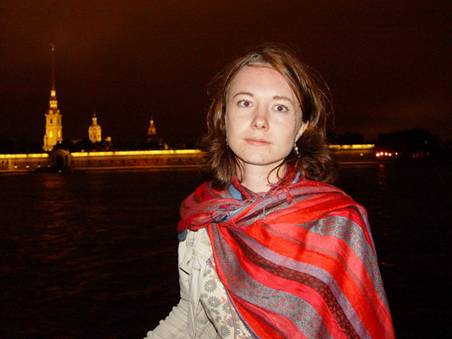
This is a letter from Masha Kamenetskaya, a young journalist and writer from St. Petersburg, Russia. She is describing her participation in the evening after the 10 December protest for fair elections in the city on the Neva.
SATURDAY 10 DECEMBER 2011: Finally I am home -- after a good and such a... real day. Even a romantic one, in some sense, when you feel that you have done the right thing in the right place.
I spent the day with my friends and loved ones -- who would have thought that a meeting of protest can be such a great occasion to see friends and to catch up with them? And I spent the day with the people living in the same city as I do. The people who smiled and who cared.
The day started with snow (in which some people saw the symbolic connection with the symbolic “against the war” white ribbons and white flowers worn and carried by the meeting participants), continued with lunar eclipse (have you heard of it? it took place an hour before the meeting in question on Pionerskaya Square), reached its pinnacle in the square itself, and ended with me at the theatre.
You want to know about the meeting, of course. While we were walking there, I saw quite a few people, those who supported one of the peaceful ideas for the meeting and who carried white carnations; police women jumping out of their cars like snowflakes; old-aged people, accompanied by their grandchildren -- all headed there. And I saw hundreds and hundreds of others, too. .A helicopter was spinning above the Kazan cathedral. OMON [special security forces -- auth] trucks were "hidden" from view just around the corner. There were also internal-security military vehicles there, too, with, probably, lots of soldiers inside -- but over the course of the day, we never once saw any Army soldiers.
- Bookmark :
- Digg
- del.icio.us
- Stumbleupon
- Redit it
- Posted by - (1) Comment
A LETTER FROM MASHA KAMENETSKAYA, ONE OF MANY
PROTESTERS IN ST. PETERSBURG, RUSSIA, LAST SATURDAY
When you feel that you have done the right thing in the right place
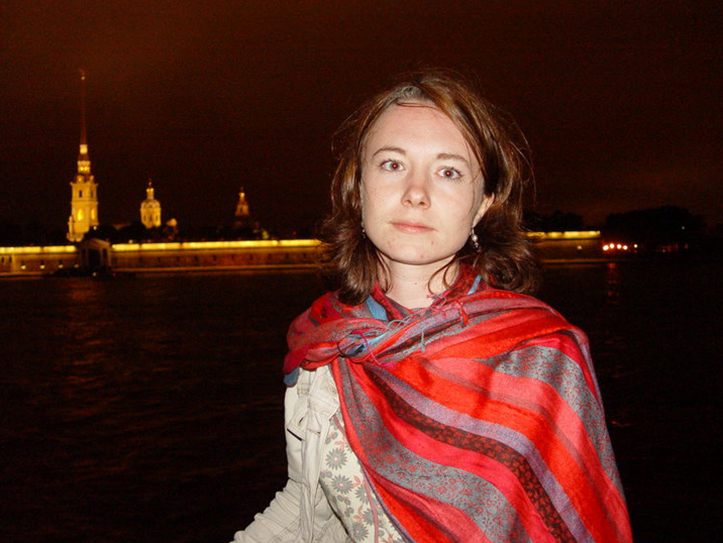
This is a letter from Masha Kamenetskaya, a young journalist and writer from St. Petersburg, Russia. She is describing her participation in the evening after the 10 December protest for fair elections in the city on the Neva.
SATURDAY 10 DECEMBER 2011: Finally I am home -- after a good and such a... real day. Even a romantic one, in some sense, when you feel that you have done the right thing in the right place.
I spent the day with my friends and loved ones -- who would have thought that a meeting of protest can be such a great occasion to see friends and to catch up with them? And I spent the day with the people living in the same city as I do. The people who smiled and who cared.
The day started with snow (in which some people saw the symbolic connection with the symbolic “against the war” white ribbons and white flowers worn and carried by the meeting participants), continued with lunar eclipse (have you heard of it? it took place an hour before the meeting in question on Pionerskaya Square), reached its pinnacle in the square itself, and ended with me at the theatre.
You want to know about the meeting, of course. While we were walking there, I saw quite a few people, those who supported one of the peaceful ideas for the meeting and who carried white carnations; police women jumping out of their cars like snowflakes; old-aged people, accompanied by their grandchildren -- all headed there. And I saw hundreds and hundreds of others, too. .A helicopter was spinning above the Kazan cathedral. OMON [special security forces -- auth] trucks were "hidden" from view just around the corner. There were also internal-security military vehicles there, too, with, probably, lots of soldiers inside -- but over the course of the day, we never once saw any Army soldiers.
People were snapping photos on their way to the square and saying cheerfully into their phones: "So where are you? Where should we meet?" It seemed as though they were all going to a big party.
Shop clerks and waiters from cafes nearby were looking out the windows and also -- smiling, curious about the goings-on.
At the square itself: flags of different political parties, a flag with the "31" on it [reference to the Edouard Limonov’s “Strategy-31” political initiative], a flag with Che Gevara’s portrait, a black and yellow flag of unknown origins, protest posters -- the surreal decoration of a huge New Year’s tree. The Griboedov statue looking down on us all. An advertisement billboard with Dmitry Khvorostovsky [popular opera performer -- auth] on the back of it.
Line of the OMON policemen, less emotional still than the stone Griboedov. The meeting was a legal one [approved by the municipality – auth.], and so the OMON guys were all relaxed (by their standards), they were just directing the traffic, just watching and observing. And they actually were not an eyesore today. Some photographer trying to snap a shot of a picturesque, perfectly orotund OMON policeman. He would have none of it. "But why not? Where does it say I can't photograph you?" - the photographer asks plaintively. The policeman says nothing. This dialogue in itself already feels like a small victory, doesn’t it? For the both sides.
Someone is shouting slogans. I can't see the face of the speaker. Someone has pinned to his a coat a large piece of paper with quotes from the Constitution of the Russian Federation. Someone is handing out flyers and advisory notes for the meeting’s participants. Several photographers are climbing up on the trees to catch the full view. Some young people with hand-held cameras are interviewing people -- "for their blogs," they claim.
I am trying to find the rest of my friends – the phone connection is spotty.
It's 3.30 pm, people continue to arrive from every direction. Even at this point there are more of them than the officially stated "seven thousand" attendees. More than ten thousand even (we measured the number by eye view – based on the size of the square and the approximate crowd density). The crowd feels smaller because no one is pushing or elbowing their way through. One French guy in our party says: "Not that many people. In France, in Paris, we have one million in the streets on such important occasions." So ok, maybe for us this is just a start.
There are some famous speakers at the gathering -- Artemiy Troitsky [well-known music critic – auth.], Lev Lurie [noted local historian – auth.], Victor Shenderovich [popular satirical writer – auth.]. I can see in the crowd others journalists, artists, writers. I can feel people all around me, but from my vantage point, I’m not experiencing the crowd in the negative, threatening sense of the word.
They are singing up on the stage. It feels strange, but it makes sense, somehow. There are also some stupid, excessively aggressive slogans being shouted (such as "Poltavchenko - to Chechnya!" [Poltavchenko being the newly appointed governor of St. Petersburg – auth.], which previously had been declared "unwanted" in the social-networks discussions. There are also some idiots in the crowd who later on would ignite fire bombs, but their number is very small.
We discuss issues related to today’s events, as well as our personal matters. But we all are keenly mindful of where we are. It's getting cold, and we start to regret we didn't bring hot tea. We go to the pizza parlor across the street. It's noisy and very crowded in there. The pizza-parlor bar seems to be pulling in its weekly haul in just one hour. For a split second I get the strange feeling I know everyone in here. It's nearly 5 pm. The “official” part is to start wrapping up shortly. Later I will find out there were provocateurs in the crowd, too, inciting people to "overthrow the government." They were promptly arrested, which doesn’t feel right, either. But their actions were stupid. Most people in the square don't want to overthrow anything, they just want fair elections.
And off to the theatre I go from there.
The performance I watch allows the actors to interact with the audience. One of the actors, playing a clown of sorts, comes off stage to walk in-between the rows. "Who did you vote for?" - he asks random people in the audience. "Oh, you didn't vote? Then you voted for "EdRo!" [the United Russia, pro-Putin party – auth.] This is quite unimaginable – this fearlessness. They are acting, of course, but they also want to show they care about more than the mere acting. Then they proceed to drag onto stage a random audience member, for public’s entertainment. "Did you go to the Pionerskaya square?" -- they inquire of the man all of a sudden. "I forgot," -- he mumbles. "Oh, how about that, you forgot!" – the actors retort in saccharine voices. -- "I don't know where it is exactly," the man stammers. -- "Oh, indeed, it must be so difficult to find out!" -- they nod sarcastically. -- "Now, go away!"
I am pleased -- not because of the performance as such, but because these guys on the stage played fairly, openly. They have a voice and they know how to use it.
The only disappointment of the day was... I don't know if this makes any sense to you... the TV-show "ProjectorfParisHilton." [Number one-rated comedy talk show on Russian TV – auth.] It is a show with four guys sitting at the table and discussing the news of the week from the humorous perspective. Until now, I used to respect those four fellows, I thought them clever and funny. They could have handled themselves and the situation in the country with dignity this time also, even though they work for the government’s primary TV channel, Channel 1. They also play clowns of sorts, you know. I was waiting to hear what they had to say.
Well, and what did they do? They just MENTIONED the elections briefly, and then they moved on to discussing some soccer match, as though there was nothing else of importance happening in the country. It was both un-funny and insincere. I realize that they had been told to keep their mouths shut about the elections, and so on. But this was their opportunity to use their voices, as some other public people have done. It would have been better if they simply, literally had kept silent. They could have just refused to go on the air this week. But they chose to obey the command.
Yet still, in all, this was a good, inspiring, honest day. I heard from other people those same words, too: "I really enjoyed this day!" – a very atypical statement for the normally skeptical and withdrawn citizens of for St. Petersburg.
I was thinking of how to finish this letter. I was thinking of all those big themes of today: inspiration, changing the rules set by others, trying to combat fear. And this is what came to mind:
‘It's a pun!” the King added in an offended tone, and everybody laughed, `Let the jury consider their verdict,' the King said, for about the twentieth time that day.
`No, no!' said the Queen. `Sentence first--verdict afterwards.'
`Stuff and nonsense!' said Alice loudly. `The idea of having the sentence first!'
`Hold your tongue!' said the Queen, turning purple.
`I won't!' said Alice.
`Off with her head!' the Queen shouted at the top of her voice. Nobody moved.
`Who cares for you?' said Alice, (she had grown to her full size by this time.) `You're nothing but a pack of cards!'
Which, do you think, are they key words here?
- Bookmark :
- Digg
- del.icio.us
- Stumbleupon
- Redit it
- Posted by - (0) Comment

Paulius Kulikauskas
Mr. Kurosky,
I do not quite understand what you are shaming your historic motherland for. Certainly there is room for improvement in many things in Lithuania. Some part of the society and some individuals in Lithuania do not tolerate other people for any features or habits, and the list of the latter could be very long. You will certainly find people with rather intolerant attitudes in many other countries.
That is, again, very sad. Yet I find shaming the whole state and the whole society for that unfair.
Lithuania's record with the human rights is generally considered in line with the international conventions. As to the homosexuals, you find them even in the Seimas (Parliament), chairing most important committees. I have some close friends who are homosexual, both living in Lithuania and visiting from abroad. While sometimes uncomfortable, no-one ever complained about human rights, rather about lack of tolerance in the society. I agree with you that legal discrimination on the basis of sexual preferences is indeed intolerable. The mere fact that some people do not approve of other peoples preferences does not make it a violation of human rights, unless they act to harm your legitimate rights on the basis of their intolerance. Having you personal preferences approved by the others is not a human right. What makes you think that the State of Lithuania discriminates sexual minorities, can you please substantiate your claim with references to legislation, legal practices, and facts from personal experience? Your statement is so high pitched, with mixed up references to state dignitaries, international organisations, religion, your sexual practices and failed personal dreams, that without additional substance it may, er, using your words, "fail miserably" in furthering your dream - "to go home to beloved motherland"?
Paulius Kulikauskas
- Bookmark :
- Digg
- del.icio.us
- Stumbleupon
- Redit it
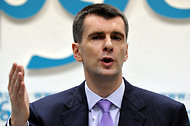
Mikhail D. Prokhorov
MOSCOW — Amid a crescendo of complaints from Russians fed up with the country’s tightly controlled political system, two prominent figures — a billionaire industrialist and the recently ousted finance minister — sought to fill a void in the opposition leadership on Monday.
The billionaire, Mikhail D. Prokhorov, who owns shares in a major gold mining company and an array of other ventures in Russia as well as the New Jersey Nets basketball franchise in the United States, said he will run for president, challenging Prime Minister Vladimir V. Putin.
“I made a decision, probably the most serious decision in my life: I am going to the presidential election,” Mr. Prohkorov said at a news conference. He has barely appeared in public since mid-September, when he was dramatically removed as the head of a pro-business party, Just Cause, after clashing with Kremlin political strategists.
- Bookmark :
- Digg
- del.icio.us
- Stumbleupon
- Redit it
Latvians rush to withdraw cash from Swedbank
- Posted by - (0) Comment
![]()

“Rumours made about Swedbank are falsea and absurd. All banking operations are functioning. We urge people not to fall victim to rumours and assess them critically,” said Swedbank in a tweeted statement made Sunday evening.
The reason for such a statement was the fact that long queues of people formed outside Swedbank ATMs after rumours started to circle in social networks that the bank was having problems.
Some ATMs ran out of money as a result.
According to one Latvian entrepreneur, there are rumours that the whole management of Swedbank Latvia has been arrested while other claims said that the bank was having problems in Estonia.
- Bookmark :
- Digg
- del.icio.us
- Stumbleupon
- Redit it
- Posted by - (0) Comment
Worldwide revolts
against egocentric,
greedy leaders
- but not in Lithuania

2011 has been the year when people around the world began to speak up. Leaders in many countries, be it in politics, finance or other areas, have this year been forced to realize that it no longer is possible to deceive their citizens. In some countries the protests have evolved into revolts, often bloody, in which state leaders have been forced to abandon their posts.
But people in Lithuania have not reacted like that, despite the fact that the downturn and tightening measures they have been exposed to probably have been the worst and toughest in Europe.
Here in this country the elderly people sit in their small, dark apartments and suffer themselves quietly through catastrophic difficult time after their already minimal pensions were drastically cut, while prices for heating, electricity and food continue to rise.
Nor do the young take to the streets to protest against the injustice they are exposed to. Instead, they pack their suitcases and leave their home country. Many probably forever. 350 persons per day are now leaving, I have been told.
“Before they realized what is going on and who was robbing them, the Lithuanian people got clubbed by PM Kubilius’ ambitious austerity policy and the younger ones started emigrating in catastrophic numbers, seeing no future in the country whose GDP was reduced (from a low post-Soviet level) by some 20% by the combination of the old nomenklatura rent-seeking policies and the global Great Recession. Lithuania is hollowing out, unfortunately,” wrote Dr. Val Samonis in an article here in VilNews last April, concluding that “the Greeks won, the Lithuanians lost!”
- Bookmark :
- Digg
- del.icio.us
- Stumbleupon
- Redit it
- Posted by - (1) Comment
Worldwide revolts against
egocentric, greedy leaders
- but not in Lithuania
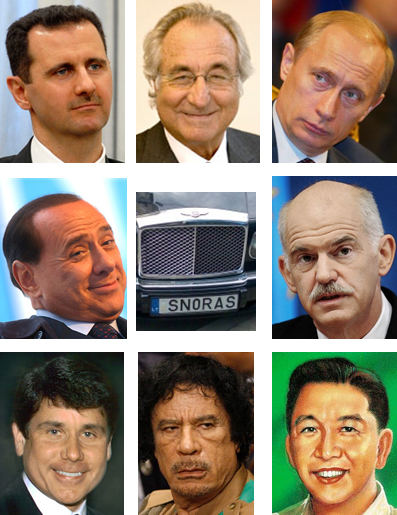
2011 has been the year when people around the world began to speak up. Leaders in many countries, be it in politics, finance or other areas, have this year been forced to realize that it no longer is possible to deceive their citizens. In some countries the protests have evolved into revolts, often bloody, in which state leaders have been forced to abandon their posts.
But people in Lithuania have not reacted like that, despite the fact that the downturn and tightening measures they have been exposed to probably have been the worst and toughest in Europe.
Here in this country the elderly people sit in their small, dark apartments and suffer themselves quietly through catastrophic difficult time after their already minimal pensions were drastically cut, while prices for heating, electricity and food continue to rise.
Nor do the young take to the streets to protest against the injustice they are exposed to. Instead, they pack their
suitcases and leave their home country. Many probably forever. 350 persons every day, I have been told.
“Before they realized what is going on and who was robbing them, the Lithuanian people got clubbed by PM Kubilius’ ambitious austerity policy and the younger ones started emigrating in catastrophic numbers, seeing no future in the country whose GDP was reduced (from a low post-Soviet level) by some 20% by the combination of the old nomenklatura rent-seeking policies and the global Great Recession. Lithuania is hollowing out, unfortunately,” wrote Dr. Val Samonis in an article here in VilNews last April, concluding that “the Greeks won, the Lithuanians lost!” See https://vilnews.com/?p=5117
“The Baltic states have discovered a new way to cut unemployment and cut budgets for social services: emigration. If enough people of working age are forced to leave to find work abroad, unemployment and social service budgets will both drop. This simple mathematics explains what the algebra of austerity-plan advocates are applauding today as the “New Baltic Miracle” for Greece, Spain, and Italy to emulate. The reality, however, is a model predicated on economic shrinkage as a result of wage cuts. In the case of Latvia, this was some 30 percent for Latvian public-sector employees (euphemized as “internal devaluation”). With a set of flat taxes on employment adding up to 59% in Latvia (while property taxes are only 1%), it would seem hard indeed to present this as a success story.”
This writes the professors Jeffrey Sommers, Arunas Juska and Michael Hudson in today’s VilNews, under the headline "The Baltic Tigers" False Prophets of Economic Austerity.” See http://www.globalresearch.ca/index.php?context=va&aid=28085
Contempt for leaders implies social revolution
Incompetence leads to loss of confidence in directing classes
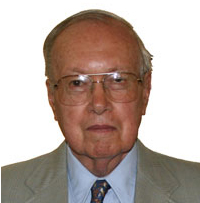
Here is another interesting article, by T.R. Fehrenbach in San Antonio express-news:
A large part of the world is continuing to show restiveness and rebellion toward the groups that run society.
Not just to governments, to which Europeans have become rather cynically apathetic — but to the entire “expert” structure of modern societies. Governments can always be changed by bullets or ballots, but distrust of and contempt for the directing classes implies social revolution.
Historically, several things have brought this about. In 14th century France, the failure of the feudality to protect the kingdom against the English created a vast, bloody peasant uprising. Nations that lose wars usually repudiate their ruling bodies. And sometimes proof of sheer incompetence may bring down the leading classes, whether chosen by birth, economic or military power, or election. In fact, if ruling classes precipitate their downfall, it proves their incompetence.
Incompetence is often more a spur than oppression. From my war experience, I know that troops would rather serve a capable SOB than a popular, wishy-washy commander. (You can cuss the first; the second may make you dead.) Nothing can destroy an army faster than loss of confidence in its leaders, and that goes for nations.
Which brings us to the question: Today, whom do we trust?
Politicians? The polls, where taken, indicate otherwise, from Europe to America. After all, no president, premier, secretary of the treasury or finance minister, nor any chief economic adviser or council predicted the current mess — and in the aftermath, all show symptoms of the Japanese disease, which causes governments to either not know what to do, or knowing, lack the bowels to do it.
Bankers and financial bigwigs? Since 1908 most people love neither them nor their shills and Wall Street analysts, for the reasons listed above. They have shown, in crisis, that their primary instinct is to save their own asses. This of course spawns cowardice in “the markets.”
Media, including pundits and script-readers? These put forth myriad versions of reality, guided more by their stomach juices than rational perception of what happened and who did it. Politicization has killed much trust in media. People no longer believe what they read in the funny papers, if they read them at all.
Economists? See politicians and bankers, above. They are the last to grasp what's going down (or will go down), and this dismal crew can't agree on much in any case. (Let me say in fairness that modern economies are too complex to allow working models or money games. If economists went back to basic economic principles — read Adam Smith — and abjured pet theories and half-baked panaceas, they might be worth paying.)
Clergy? The mainline, or mainstream churches are so caught up in populist neo-paganism (that is, modern culture), that they provide little relief or comfort.
Can any leading class be trusted? Polls show that Americans trust the medical profession (nurses over doctors) first and the military second. OK. These professions are the most vital to society, whose first duty is to survive.
Only incompetents would want to harass the first and down-size the second.
Read more: http://www.mysanantonio.com/news/article/Incompetence-leads-to-loss-of-confidence-in-1920816.php#ixzz1g19JohO1
- Bookmark :
- Digg
- del.icio.us
- Stumbleupon
- Redit it
- Posted by - (0) Comment
Russia is seeing the largest show of public anger in the country since the collapse of the Soviet Union 20 years ago. The centrepiece is massive rallies in Moscow, with more than 30,000 people demonstrating. But protests take place in more than 70 other cities in the sprawling country.
Vladimir Putin,
the beginning of the end

Apart from silencing opponents and enriching personal friends, the one thing Vladimir Putin was really good at was fixing elections. In this, he had a perfect track record since March 2000—until last Sunday. The Russian parliamentary election on December 4th was neither free nor fair. Several opposition groups had been barred from the ballot; officials pressured voters to support the ruling party; the vote-count was marred by ballot-stuffing and the rigging of protocols. But even in these conditions—and even by the official figures—most Russians voted against Vladimir Putin. His party, United Russia, received 49.3 percent of the vote, losing its two-thirds supermajority in Parliament for the first time in eight years. Compared to the last poll in 2007, when it registered 64.3 percent, United Russia’s result represents a net loss of 13 million votes and 77 seats in the 450-seat Duma (down from 315 to 238).
- Bookmark :
- Digg
- del.icio.us
- Stumbleupon
- Redit it
- Posted by - (1) Comment
Russia is seeing the largest show of public anger in the country since the collapse of the Soviet Union 20 years ago. The centrepiece is massive rallies in Moscow, with more than 30,000 people demonstrating. But protests take place in more than 70 other cities in the sprawling country.
Vladimir Putin,
the beginning of the end

Apart from silencing opponents and enriching personal friends, the one thing Vladimir Putin was really good at was fixing elections. In this, he had a perfect track record since March 2000—until last Sunday. The Russian parliamentary election on December 4th was neither free nor fair. Several opposition groups had been barred from the ballot; officials pressured voters to support the ruling party; the vote-count was marred by ballot-stuffing and the rigging of protocols. But even in these conditions—and even by the official figures—most Russians voted against Vladimir Putin. His party, United Russia,received 49.3 percent of the vote, losing its two-thirds supermajority in Parliament for the first time in eight years. Compared to the last poll in 2007, when it registered 64.3 percent, United Russia’s result represents a net loss of 13 million votes and 77 seats in the 450-seat Duma (down from 315 to 238).
The 2011 election was a turning point for Putin’s regime. Not because the new parliament will rebel against the Kremlin—it will likely be just as obedient as before. Not because the three officially approved parliamentary “opposition” parties (the Communists, the left-wing Just Russia, and Vladimir Zhirinovsky’s nationalist LDPR) will pose a serious challenge—on important issues, they will likely follow the Kremlin’s orders. It was a turning point because December 4th shattered the myth of Putin’s invincibility. The regime whose leaders clearly counted on maintaining their supermajority (Duma Speaker Boris Gryzlov declared that the party was not planning to lose “a single seat”) failed to reach even the 50 percent mark. From now on, voters who were intimidated (especially in the provinces) will not be intimidated as easily. Careerists who backed the regime for personal advancement will begin weighing their options. After 12 years of standing still, Russia’s political pendulum is beginning to swing in a new direction.
The election itself represented no improvement. The head of the OSCE’s observation mission aptlycompared the poll to “a game in which only some players are allowed on the pitch, and then the field is tilted in favor of one of the players.” Nine opposition parties—from the center-right Popular Freedom Party to the left-wing United Labor Front—were barred from the ballot altogether. Television coverage was heavily slanted toward the ruling party. Administrative interference from officials ranged from openly coercing state employees into backing United Russia to conditioning future budget allocations on the party’s vote tally. On voting day, there were numerous cases of ballot-stuffing, multiple voting, unlawful eviction of observers and journalists, and the outright rigging of protocols. At 30 percent of polling places observed by OSCE monitors, the vote count was assessed as “bad or very bad.” The Moscow-appointed leaders of the North Caucasus once again proved faithful providers of Kremlin votes: United Russia registered 91 percent in Ingushetia, 92 percent in Dagestan, and 99 percent in Chechnya. Russia’s sole independent election monitoring group, Golos, found itself under attack from the authorities: the group was investigated and fined, its director was detained at the airport, and her laptop confiscated. Ten percent of Golos monitors were denied access to polling places under various pretexts. On election day, the websites of leading independent media organizations, including Ekho Moskvy radio, were crashed by sustained cyber-attacks.
United Russia’s actual result was likely much lower than the official figure. An exit poll conducted by the Institute of Social Studies put the ruling party’s vote at 38 percent (officially 49.3 percent), followed by the Communists with 24 percent (officially 19.2), Just Russia with 15 percent (officially 13.3), the LDPR with 14 percent (officially 11.7), and the liberal Yabloko party with 5 percent (officially 3.4). The latter figure is significant. Crossing the 5 percent threshold would have given Yabloko—the only pro-democracy party on the ballot—not only a voice in Parliament, but also unimpeded access to presidential and regional elections (parliamentary parties do not have to collect signatures to register for the ballot). Yabloko’s votes were most obviously stolen in Moscow, where its 18 percent votetally reported by independent observers was halved to 9 percent in the official protocols.
The day after the election, in what became the largest pro-democracy rally in a decade, 10,000 people gathered in downtown Moscow to protest the unfair vote. Hundreds were arrested and spent the night in police cells. Prominent activists Ilya Yashin and Alexei Navalny received 15-day prison sentences. On Tuesday, the arrests continued, with opposition leaders Boris Nemtsov, Sergei Mitrokhin, and Eduard Limonov among those detained by police. The Interior Ministry has confirmed that it is sending its elite Dzerzhinsky division to “keep order” in the capital.
With the majority against them, and with more and more people prepared to express their frustration not just at the tainted polls, but on the streets, Russia’s leaders face a dilemma. They can either take steps to reform and liberalize the political system—and almost certainly be voted out of office. Or they can attempt to preserve their power by further repression—and likely repeat the fate of Hosni Mubarak. Either way, Putin’s exit now seems merely a matter of time.

Read more: http://www.worldaffairsjournal.org/blog/vladimir-kara-murza/vladimir-putin-beginning-end
- Bookmark :
- Digg
- del.icio.us
- Stumbleupon
- Redit it
![]()

Lithuania flies the flag
Who comes first worldwide in delivering high speed internet to consumers? Well you can forget the USA and the UK. Step forward Lithuania in the No 1 spot, with a speed of 31.89 mbps, an awesome 99.6 per cent of the figure advertised.
In second place as far as keeping promises is Sweden, with 26.23 mbps, 85 per cent of the figure claimed.
The USA is in 33rd position with 12.20 mbps, which is 93.6 per cent of the figure claimed. The UK is in 38th position with 11.04mbps, which is 72.6 per cent of the figure advertised.
At speed rank 66 is crisis country Greece with 6mbps, 44.4 per cent of the figure claimed.
"Service providers loudly promote their download speeds," says the Wall Street Journal. " But it's tough for consumers to know just how high-speed that Internet access really is."
Government regulators in several countries are now discovering that providers' performance often fail to match their claims: meaning more time spent waiting for video to buffer, photos to load, and online games to continue.
"We found that people were making decisions based on advertised speeds, which bore little resemblance to actual speeds," says Ian Macrae, director of the broadband-testing project for the U.K. Office of Communications.
In the past three years, says the WSJ, U.S. and U.K. regulators have been testing broadband lines and publishing their findings, running actual and advertised speeds side by side. The European Commission has now also signed on signed on with the same British firm SamKnows.
The FCC's August figures showed most companies in the US delivering 89% of advertised speed.
Steven Bauer, a computer scientist at the Massachusetts Institute of Technology, warns however: Stray too far from your wireless router, or too close to a microwave, and the signal could degrade. "All of those issues were affecting early versions of speed tests," he says. "The FCC is really careful to control for all of those effects."
The FCC and SamKnows have met with Internet providers and academics to design a methodology that will hold up to scrutiny.
SamKnows, started by Sam Crawford in 2003 whilst at university as part of his computer sciences degree, is now advertising for 10,000 volunteers across 30 countries. Check it out at: www.samknows.com
- Bookmark :
- Digg
- del.icio.us
- Stumbleupon
- Redit it
German miracle
- Posted by - (0) Comment

Germany was very shrewd to use the Central and Eastern Europe (CEE) relatively qualified labor force to advance the national competitiveness agenda, after the Wessies have finally though belatedly discovered what a "black hole" the communist East Germany was. With large parts of CEE depopulating, this positive factor is temporary in nature though. Now the challenge is to rebalance sources of German growth, as too much emphasis on exports leaves Germany vulnerable to the vagaries of global markets. Internal demand stimulation should be a big theme, e.g. those vacation homes on Greek islands.
Valdas Samonis
- Bookmark :
- Digg
- del.icio.us
- Stumbleupon
- Redit it
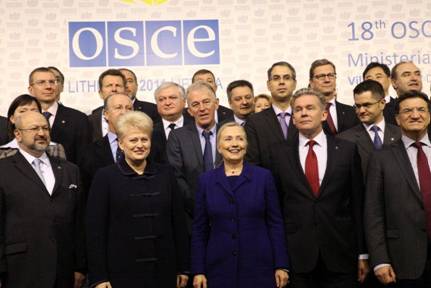
U.S Secretary of State Hillary Clinton and President Dalia Grybauskaitė fronted the OSCE conference in Vilnius this week.
By Mark Kurosky
mark.kurosky@gmail.com
This week The Republic of Lietuva has demonstrated its prestige and accomplishment being a contemporary world player and a voice for democracy taking center stage hosting the OCSE Ministerial Conference and the ESCO "Making Women's Voices Heard" convocation. Lithuanian President, Dalia Grybauskaite, must be offered kudos for assuming a leadership helm in both of these world conferences. Witnessing President, Dalia Grybauskaite, partner with and stand side by side US Secretary of State, Hillary Clinton, a woman undeniably known as the spouse of one of the most powerful men in the world in contemporary history, can only be a source of tremendous pride for Lithuanians worldwide.
During an address at the "Making Women's Voices Heard" event, and as quoted on the Lithuanian Presidential website, President Dalia Grybauskaite stated, "Any discrimination impairs the well-being of our societies. Gender gaps, glass ceilings and brick walls - an environment you navigate daily. Only through personal example and greater visibility we can attract everybody's attention to this problem and encourage combating it."
The Lithuanian President further "urged participants of the discussion to be good examples in the fight against gender inequality by assuming more responsibility in decision making, showing personal initiative, efforts, and persistence. She underlined that only public and vocal messages about gender equality issues could encourage women to be more determined in the struggle for their rights". The President praised Lithuania's efforts in the protection of women's rights and claimed Lithuania's example of such "good practice".
In stark contrast to the foregoing, and under the witness of the world's center stage spot light, one must then ask how President, Dalia Grybauskaite, the members of the Lietuva Seimas, and the contemporary, educated Lithuanian society at large, can not only tolerate, but actively promote openly stated discrimination toward gays, lesbians, bisexuals and transgendered members of Lithuanian society.
Mark Kurosky
 I am a 54 year old, gay male, a Lithuanian American, second generation born in Scranton, Pennsylvania in 1957, and I now reside in Prescott, Arizona. My grandparents immigrated from Lietuva in 1910, from Kacergine and from Miroslavas. I grew up immersed in Lithuanian culture, I am fluent in the language, have traveled Lietuva, and have family still within the country. My dream is to return to reside, work and thrive in Lietuva, however, for me most personally as a gay man, I feel that the atmosphere there would be unsafe, inhospitable, and uncomfortable. And I find this to be a shame as I would love nothing more than to go home to my beloved motherland.
I am a 54 year old, gay male, a Lithuanian American, second generation born in Scranton, Pennsylvania in 1957, and I now reside in Prescott, Arizona. My grandparents immigrated from Lietuva in 1910, from Kacergine and from Miroslavas. I grew up immersed in Lithuanian culture, I am fluent in the language, have traveled Lietuva, and have family still within the country. My dream is to return to reside, work and thrive in Lietuva, however, for me most personally as a gay man, I feel that the atmosphere there would be unsafe, inhospitable, and uncomfortable. And I find this to be a shame as I would love nothing more than to go home to my beloved motherland.
- Bookmark :
- Digg
- del.icio.us
- Stumbleupon
- Redit it
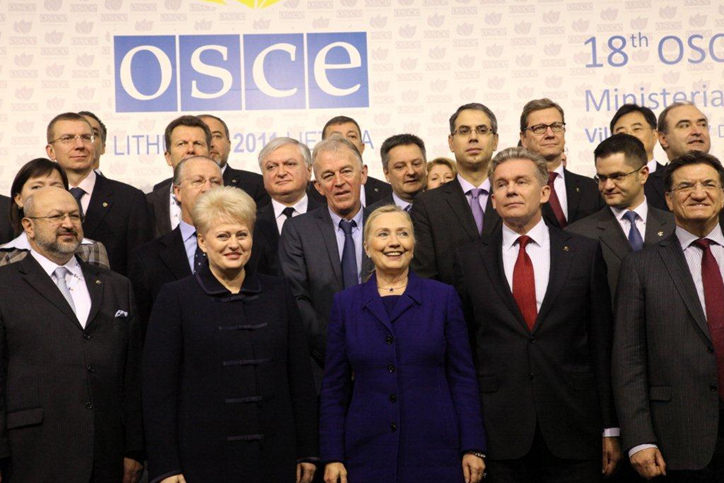
U.S Secretary of State Hillary Clinton and President Dalia Grybauskaitė fronted the OSCE conference in Vilnius this week.
By Mark Kurosky
mark.kurosky@gmail.com
This week The Republic of Lietuva has demonstrated its prestige and accomplishment being a contemporary world player and a voice for democracy taking center stage hosting the OCSE Ministerial Conference and the ESCO "Making Women's Voices Heard" convocation. Lithuanian President, Dalia Grybauskaite, must be offered kudos for assuming a leadership helm in both of these world conferences. Witnessing President, Dalia Grybauskaite, partner with and stand side by side US Secretary of State, Hillary Clinton, a woman undeniably known as the spouse of one of the most powerful men in the world in contemporary history, can only be a source of tremendous pride for Lithuanians worldwide.
During an address at the "Making Women's Voices Heard" event, and as quoted on the Lithuanian Presidential website, President Dalia Grybauskaite stated, "Any discrimination impairs the well-being of our societies. Gender gaps, glass ceilings and brick walls - an environment you navigate daily. Only through personal example and greater visibility we can attract everybody's attention to this problem and encourage combating it."
The Lithuanian President further "urged participants of the discussion to be good examples in the fight against gender inequality by assuming more responsibility in decision making, showing personal initiative, efforts, and persistence. She underlined that only public and vocal messages about gender equality issues could encourage women to be more determined in the struggle for their rights". The President praised Lithuania's efforts in the protection of women's rights and claimed Lithuania's example of such "good practice".
In stark contrast to the foregoing, and under the witness of the world's center stage spot light, one must then ask how President, Dalia Grybauskaite, the members of the Lietuva Seimas, and the contemporary, educated Lithuanian society at large, can not only tolerate, but actively promote openly stated discrimination toward gays, lesbians, bisexuals and transgendered members of Lithuanian society.
A looming white elephant in the Lithuanian living room
It seems Lithuania's human rights agenda is both conditional and selective. How ironic that President, Dalia Grybauskaite, takes a valiant position on one cause and yet ignores another as a looming white elephant in the Lithuanian living room. In the greater scheme of things, is this not even hypocritical? Yet, perhaps one cause only deflects the denied importance of another. For anyone aware of the bigger picture of the state of affairs in contemporary Lietuva this is only a conundrum. Although gender equality in itself is valid, in the wider scope of the premises of basic human values of the European Union, discrimination based on sexual preference or sexual identity is no less than intolerable. Intolerable. Within due time, and not soon enough, these affairs in Lithuania will be challenged by the governing bodies of the European Union.
And, with Lietuva in this week's world view as host to two high level conferences, and on the very day of her departure from Vilnius and arrival in Geneva, Switzerland, US Secretary of State, Hillary Clinton, presented a landmark speech stating, "The US has publicly declared it will fight discrimination against gays and lesbians abroad by using foreign aid and diplomacy to encourage reform".
The irony of such a proclamation on the day of Hillary Clinton's departure from Lietuva can surely be no mistake. Perhaps Lietuva should well hear this bell tolling loudly for her in Vilnius, in the Presidential Palace, and in The Seimas. For Hillary Clinton to make such an unapologetic statement for this "other arena of human rights" at just such an optimal moment, and to covertly imply this as a personal message to Lietuva, could not have been have been any more profound than had Hillary Clinton made this speech prior to departing Lietuva. Such a statement posed by Hillary Clinton inside Lietuva would have been a personal affront and smear to President Grybauskaite, and, obviously, Hillary Clinton thinks highly enough of the Lithuanian President to shield her from such pubic world disgrace. But disgrace is still disgrace whether it be addressed at afar from Geneva or from the floor of the LitExpo or The Seimas.
Lietuva's official governmental position on "selective human rights", and its mentality of discrimination based on sexual orientation and sexual identity may be embedded in contemporary Lietuva's longstanding tradition of Catholicism. However, one can only wonder, were these common tenets upheld throughout Lietuva's long history as Europe's longstanding pagans? Perhaps this is unlikely. In indigenous North American cultures such as the Native Americans, homosexuals and cross-gender individuals are revered as shamans, healers, or seers. I don't know about the pagan Lithuanians. However, I do know, these are simply no longer contemporary world values for any evolving society irrespective of history or religion. This is such a shame for Lietuva, for its democracy, and for its citizens. Lietuva aspires to be so much and to play such important roles in contemporary society as we have witnessed this week. Yet, Lietuva fails so miserably in basic human protections and human rights for all citizens. Shame, shame, shame on my beloved Lietuva.
Mark Kurosky
Prescott, Arizona, USA
mark.kurosky@gmail.com
Mark Kurosky
 I am a 54 year old, gay male, a Lithuanian American, second generation born in Scranton, Pennsylvania in 1957, and I now reside in Prescott, Arizona. My grandparents immigrated from Lietuva in 1910, from Kacergine and from Miroslavas. I grew up immersed in Lithuanian culture, I am fluent in the language, have traveled Lietuva, and have family still within the country. My dream is to return to reside, work and thrive in Lietuva, however, for me most personally as a gay man, I feel that the atmosphere there would be unsafe, inhospitable, and uncomfortable. And I find this to be a shame as I would love nothing more than to go home to my beloved motherland.
I am a 54 year old, gay male, a Lithuanian American, second generation born in Scranton, Pennsylvania in 1957, and I now reside in Prescott, Arizona. My grandparents immigrated from Lietuva in 1910, from Kacergine and from Miroslavas. I grew up immersed in Lithuanian culture, I am fluent in the language, have traveled Lietuva, and have family still within the country. My dream is to return to reside, work and thrive in Lietuva, however, for me most personally as a gay man, I feel that the atmosphere there would be unsafe, inhospitable, and uncomfortable. And I find this to be a shame as I would love nothing more than to go home to my beloved motherland.
- Bookmark :
- Digg
- del.icio.us
- Stumbleupon
- Redit it
- Posted by - (0) Comment
Russian MFA defends Soviet annexation of the Baltic States
Lithuanian Foreign Ministry “regrets that some senior diplomats in Russia’s MFA continue to operate in last century’s spirit of falsification of history.”
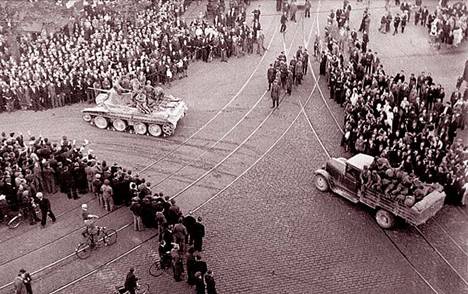
Red Army tanks enter Riga in1940.
Photo: wikipedia.org
On December 1 and 2, respectively, Lithuania’s and Estonia’s ministries of foreign affairs (MFAs) refuted the Russian MFA’s latest claims that the three Baltic States (Estonia, Latvia, and Lithuania) had voluntarily joined the Soviet Union in 1940.
Moscow’s claims in this regard are hardly new; but are being resurrected in the context of Russian-fanned tensions with the US and NATO over European security, and are presented with some new twists to the old arguments. In a radical historical innovation, Russia’s MFA statement further claims that the present-day Republic of Moldova is a Russian land (see below).
Lithuania and Estonia chose to reply in a low key. Lithuania’s MFA handed over a note to the Russian embassy in Vilnius, expressing
Read more:
http://www.jamestown.org/single/?no_cache=1&tx_ttnews[tt_news]=38747
- Bookmark :
- Digg
- del.icio.us
- Stumbleupon
- Redit it
VilNews e-magazine is published in Vilnius, Lithuania. Editor-in-Chief: Mr. Aage Myhre. Inquires to the editors: editor@VilNews.com.
Code of Ethics: See Section 2 – about VilNews. VilNews is not responsible for content on external links/web pages.
HOW TO ADVERTISE IN VILNEWS.
All content is copyrighted © 2011. UAB ‘VilNews’.

 Click on the buttons to open and read each of VilNews' 18 sub-sections
Click on the buttons to open and read each of VilNews' 18 sub-sections 















.jpg)



